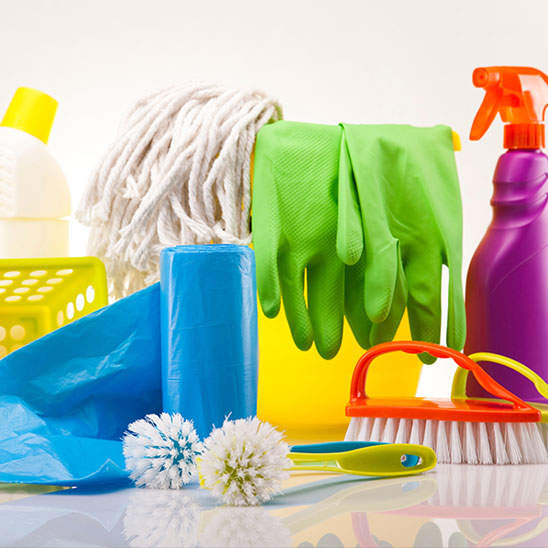Toxic chemicals commonly found in conventional cleaning products are linked to various health conditions including breathing problems, respiratory illnesses, poisonings, burns, and reproductive complications.
Spring Cleaning Poses Health Risks
Spring cleaning provides the perfect opportunity to tackle neglected household chores like waxing hardwood floors, shampooing carpets, cleaning out the fridge, degreasing the oven, sanitizing the pool, and weeding the lawn. Although spring cleaning creates a clean, organized, and clutter-free environment, it can also create significant health risks for people in the home.
Unfortunately, many homeowners are not aware that spring cleaning poses health risks due to hazardous chemicals used in cleaning products. Many cleaning products contain dyes and fragrances, as well as ingredients known to be toxic to humans. Many common over-the-counter cleaning products can cause a variety of health problems including:
- Allergies
- Asthma and respiratory illness
- Learning and developmental disabilities
- Reproductive toxicity
- Burns to skin and lungs
- Cancer
Cleaning products with toxic ingredients are a leading cause of illness in children and adults in many households. When exposure to high levels of contaminants is ongoing, an injury lawyer often witnesses severe cases of chronic respiratory illness, severe asthma, lung damage, poisoning, and certain cancers. When pregnant women are exposed to high levels of toxic cleaning products, injury lawyers see unfortunate cases of reproductive toxicity in mothers, as well as development and learning disabilities in children.
Cleaning products containing ammonia, bleach, chlorine, glycol ethers, and formaldehyde are especially dangerous to small children and pets. These contaminants increase risks for anemia, kidney and liver damage, and certain types of cancers in children and animals. Ammonia, found in many types of oven cleaners and window cleaners, is a strong irritant to mucous membranes.
Toxic Household Cleaning Products
Toxic chemicals in conventional household cleaning products vary in their severity. While some produce acute (immediate) dangers such as respiratory problems, skin chemical burns, or watery eyes, others produce chronic (long term) dangers such as allergies, asthma, fertility issues, learning disabilities (ADHD), and developmental delays. Most toxic chemicals found in household cleaners fall into three categories:
1. Carcinogens
By definition, a carcinogen is a substance capable of causing cancer in living tissue. Known carcinogens include chemicals, environmental or medical radiation, certain viruses, certain medications, and lifestyle factors. Known carcinogens found in cleaning products include ammonia, chlorine, formaldehyde, and sodium hydroxide.
2. Endocrine Disruptors
Endocrine disruptors mimic human hormones. They cause false signals within the body which contribute to learning disabilities like ADHD, fertility and menstrual problems, miscarriages, premature puberty, and certain cancers. Cleaning products are often packaged in containers that can leach endocrine disruptors.
3. Neurotoxins
Neurotoxins are poisons that act on the nervous system. They affect brain activity and contribute to problems like headaches, memory loss, and vision loss. When a person is exposed to neurotoxins, an injury lawyer commonly sees cognitive dysfunction, obsessive and/or compulsive behaviors, and tingling, weakness, or paralysis in limbs.
Common Myths About Cleaning Products
With thousands of cleaning products on the market, it is difficult to know which ones are safe and which ones are capable of causing major health problems. Today, various cleaning products promote “natural ingredients,” but even those are not as safe as people think. Before purchasing household cleaning products, it is important to distinguish between facts and myths to prevent harm.
Are Natural Cleaning Products Safe?
To prevent toxic chemicals in the home, many people look for natural products without harmful side effects. However, the reality of products promoted as “all-natural” or with “natural ingredients” is very deceiving. There are actually no federal regulations that dictate standards for products labeled as “natural.” While many “natural cleaners” may be considered safer than conventional cleaners, they are not chemical-free, non-toxic products. So-called natural products are the cause of many personal injury lawsuits filed by injury lawyers.
Products from major brands that promote natural ingredients such as Green Works, Honest Company, Method, Mrs. Meyers, and Seventh Generation all contain toxic chemicals like allergens and skin and respiratory irritants. According to the Environmental Working Group (EWG), safety ratings for many products produced by these well-known companies receive D and F ratings due to dangerous allergens, dyes, fragrances, and preservatives.
Are Botanical Ingredients Safe?
While “botanical ingredients” indicate something safe derived from nature, many contribute to illness. Some essential oils contain eugenol and limonene, chemicals that can trigger allergic reactions. Cleaners containing citrus and pine oil emit chemicals called terpenes that can form formaldehyde when they reach the air’s ozone.
Are Cleaning Products Tested for Safety?
Out of 62,000 chemicals approved for use in the United States, only about 300 have actually been tested for safety by the Environmental Protection Agency (EPA). Many cleaning products have not been tested since 1976, an alarming fact for injury lawyers who see serious injuries caused by everyday household cleaning products.

